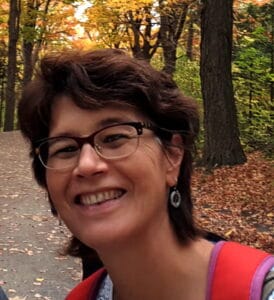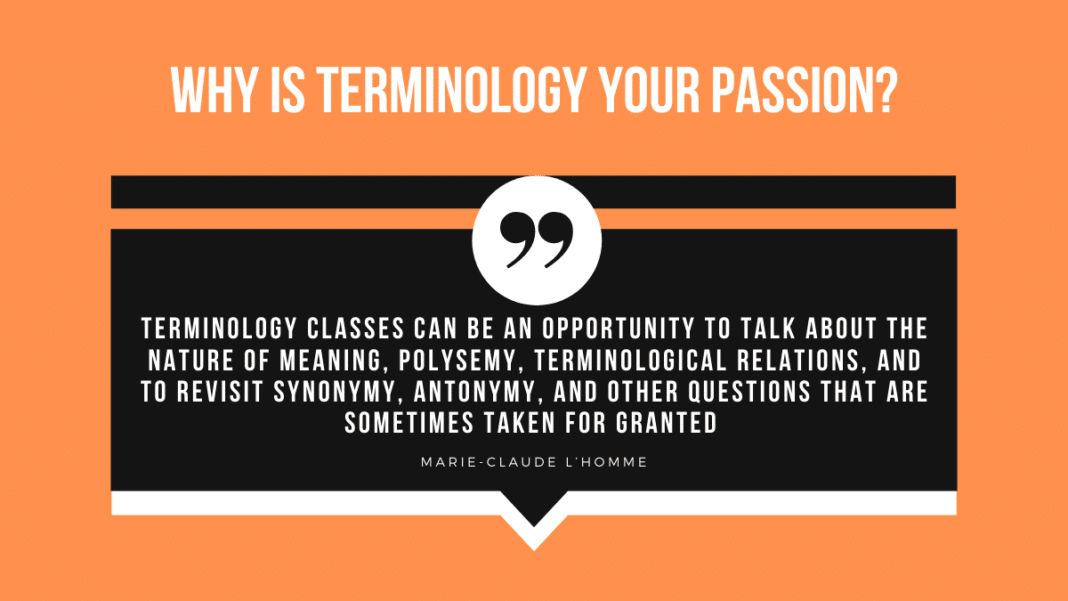
Marie-Claude L’Homme is a full professor at the Department of Linguistics and Translation, University of Montreal, and a member of the Observatoire de linguistique Sens-Texte (OLST), a research group she headed for almost 10 years. Her research topics are Terminology theory and lexical semantics and corpus linguistic applied to terminology. She supervises the development of multilingual terminological resources (DiCoInfo, DiCoEnviro, and Frame DiCoEnviro). She is the author of a French textbook in Terminology (La terminologie : principes et techniques; the second edition was published in 2020) and an English book on the application of lexical semantics to Terminology (published by John Benjamins in 2020). She was co-editor of Terminology for almost 20 years (2000-2019).
1. What fascinates you about terminology?
What is fascinating about terminology is the fact that it is both multidisciplinary and a fundamental component of many different applications, such as general and specialized lexicography, knowledge modelling, automatic or semi-automatic processing of specialized texts, and language planning. In addition, Terminology, when compared to other disciplines, is relatively new, and very intriguing questions remain to be explored and investigated. Terminology can also be studied from different perspectives, which makes it particularly interesting. Personally, I am interested in the linguistic issues that terminology work raises.
I discovered terminology when I began my training in translation at Laval University in Quebec City. I was hooked right away as the professor (the late Jean-Claude Boulanger who then became my supervisor), made me discover not only terminology, but also linguistics, lexicology and lexicography, and showed how these disciplines can help us answer questions raised by translation practice. I also became acquainted with language planning, an area in which Quebec has been a leader for decades. During my studies, I was fortunate enough to participate in fascinating research projects focusing on computational applications of Terminology.
2. What is your opinion about the new version of IATE?
As someone who teaches in Canada, I first tell students about Canadian term banks: Le grand dictionnaire terminologique and Termium Plus®. However, other important term banks are also presented, and especially IATE. In addition to its historical background and the fact that it covers many different languages, IATE contains terms that pertain to domains that Canadian term banks do not cover.
Personally, I am impressed by the work that was done to make the rich information that IATE contains more easily accessible. The simple interface allows users to specify a language pair and run a search right away. Users can also specify more sophisticated search options. The presentation of the results can still be a little overwhelming at times, but mostly, users can find ways to easily access the specific information they are looking for.
3. What is the profile of an “ideal” terminologist, to your mind?
There are different ways to answer this question since they are different professional and academic settings in which terminologists can work. First, terminologists should be versed in Terminology theory and methods, be comfortable with computer applications and understand how far they can go with them, be able to run sophisticated searches in large quantities of documents in electronic form. Considering the recent directions that Terminology has taken, terminologists should also become acquainted with knowledge modelling techniques, corpus linguistics and lexical semantics.
4. You have been a terminology professor at the University of Montreal for almost 27 years. What aspects of terminology are especially challenging for students?
27 years? Really? Time flies! At the University of Montreal, Terminology is taught as a compulsory subject in translation curricula. Professors of Terminology must try to transmit their passion for the subject and gradually make students realize that Terminology is not only a series of methods that were designed to help translators find equivalents for specialized terms.
Terminology classes can be an opportunity to talk about the nature of meaning, polysemy, terminological relations, and to revisit synonymy, antonymy, and other questions that are sometimes taken for granted.
It is also a great opportunity to teach students to remain critical of the information they find, to trust their intuition and to validate it with linguistic methods. If a professor manages to teach these topics, Terminology becomes a fascinating subject, even for students who do not plan to specialise in that area.
5. You are the regular member of the Observatoire de linguistique Sens-Texte (OLST). Could you tell about your objectives and tasks in this research group?
The Observatoire de linguistique Sens-Texte (OLST) is a research group with professors, researchers, students, and collaborators who are interested in words and terms. Members are linguists, terminologists, experts in information science and language pedagogy, and computational linguistics. Research projects in which members of the group are involved address theoretical issues, devise methodologies and develop applications in which expertise in linguistics, lexicology and terminology is necessary. The group also develops lexical and terminological resources in different languages that are freely available, such as the DiCouèbe (a combinatorial general language resource) and the DiCoEnviro (a specialized resource on the Environment).
6. What terminological tools do you use on the daily basis?
The tools I use most frequently (not on a daily basis, I am afraid) are term extractors (TermoStat, developed by my colleague Patrick Drouin), concordancers (an in-house concordancer and AntConc), an XML editor (oXyGen). These tools are also used by the students who participate in my research projects. I also present them in Terminology courses.
7. How do you see the development of terminology in public institutions and in the private sector and social media in the following years?
As a researcher, I do not think I am in the best position to answer this question. As far as I can tell, Canadian public institutions seem to quickly adapt to social and technological changes.
8. In what projects have you been recently involved?
Recent research projects that I have been leading consist in studying the linguistic properties of terms and discovering how terms and their linguistic properties contribute to the conveyance of knowledge in special subject fields. Our approach, based on the linguistic theoretical frameworks of Explanatory Combinatorial Lexicology (Mel’čuk et al. 1995) and Frame Semantics (Fillmore 1982), fully integrates linguistic and terminological analysis through all steps of terminology work. The results of our work are encoded in two multilingual resources, called the DiCoEnviro and the Framed DiCoEnviro. These resources focus on environment terminology. The DiCoEnviro accounts for fine-grained semantic distinctions, provides long lists of terminologically-related terms (including, but not limited to, collocations) and contains detailed contextual annotations (based on the methodology what was developed in the FrameNet project). The Framed DiCoEnviro describes conceptual situations that occur in the environment; these situations are modelled on the basis of the linguistic properties of terms. Most terminological resources give very little linguistic information about terms. The DiCoInfo and the Framed DiCoEnviro could be considered as alternatives to existing resources. Our claim is that we want to account for the linguistic properties of terms adequately, we must rethink resources completely. We cannot simply add a few linguistic features to resources that were first designed based on conceptual principles.
9. Which book, paper, project, etc. would you recommend to people, and especially terminologists, to read/ follow?
Terminologists already know textbooks and important publications in their field. I would recommend reading material outside their field of expertise: lexical semantics, ontology modelling, corpus linguistics, etc.
10. What advice would you give to novice terminologists?
I can think of many things, but I believe they all come down to two basics: always be critical of what you find or read. You can make up your mind about what other fellow terminologists say only after having acquired a deep understanding of the methodology they applied, the results they obtained or the resources they compiled.

Written by Olena Khomiakova, Schuman Communication Trainee Terminology Coordination Unit. Currently she is enrolled as a Master student in Learning and Communications in Multilingual and Multicultural Contexts at the University of Luxembourg.

